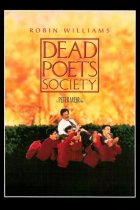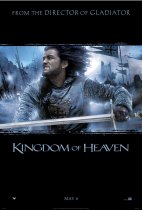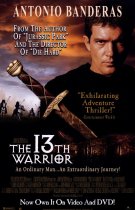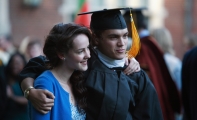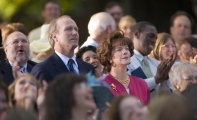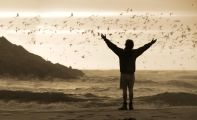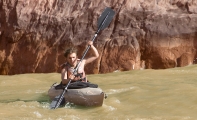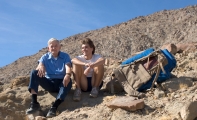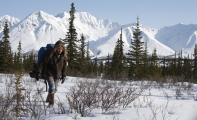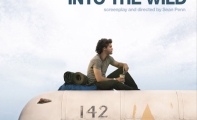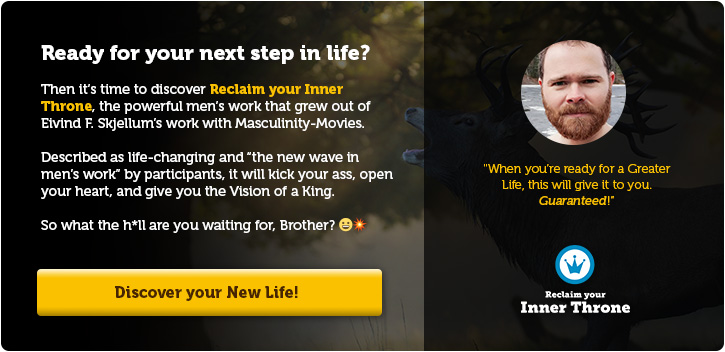Into the Wild (2007)
Synopsis
Into the Wild is the story of Christopher McCandless, an intelligent and charismatic young man from a troubled family who has the world at his feet. But it’s a world he doesn’t want, so he sets out to the great open Wild of Alaska to discover himself and what he truly longs for. And finds that the answer is closer to home than he expected.

| Genre | Drama |
| Production year | 2007 |
| Director | Sean Penn |
| Male actors | Emile Hirsch, William Hurt, Vince Vaughn |
Where men become specks of dust on the wind
by Eivind Figenschau Skjellum
Preface
I would like to preface this review by telling you that I haven’t read Jon Krakauer’s book and I haven’t done extensive research on Christopher McCandless’ life. But please understand that I approach this review with tremendous respect and humility, for the story that is told involves real people and real fates.
Director Sean Penn spent ten years of his life trying to make this film a reality. He did so with the blessings of Christopher’s family and with a tremendous team of actors and filmmakers working with him for eight months. They set out to treat the story with as much love and care as they could and it is because of this that I trust the film to be an accurate testament to the spirit of the man, his life, and of the character of the people he loved and who loved him. I will write this review in the present tense. I hope it doesn’t offend anyone.
The fears of the fathers
Chris grows up in a dysfunctional family home, where the parents are frequently violent towards each other, and the kids are used as players in a tug-of-war. He has little respect for them and considers them bankrupt human beings. Early on in the film, Chris receives his diploma from Emory university. He launches playfully and somewhat rebelliously onto stage to accept it to the cheers of his fellow students. A disapproving frown spreads on his parents faces.
This scene, together with the dinner scene that follows, holds the key to understanding why Chris sets out on his journey. Chris is extremely resourceful and intelligent, and can function brilliantly within the confines of a highly structured and controlled society. He can play with “the big boys” if he wishes; his grades are good enough to get into Harvard Law school!
But he despises the false and fraudulent ways of society, where human beings are forced to deny their basic human nature, their playfulness and shared humanity to operate in “the system” – the collective – without causing a glitch to appear in its matrix.
Say if it were the truth that, like Chris believes, we live in a world that is almost stripped of real love and real truth. If so, we can see in these scenes how Chris itches to free himself from this way of being in the world, and how his parents clench on to it. They are terrified of letting go of structure, formalities, finding solace in money and things, and their own personal stories of pain. Chris’ relationship to his father represents the generation gap that many of us know well.
We are the men with a deep need for an emotional and truthful connection with our fathers, but wehave fathers who are too afraid or shut down to open up and provide it. They grew up in a world where survival was the primary goal, and the joy of building emotional connections based on truth was an unnecessary distraction.
Chris is suffocating. He has only been given the chance to express the gifts that are approved by society and his parents. But he is deeper than that. More profound. And he is not free. He is imprisoned by the fear of his parents and society. He himself is afraid of becoming like them. Afraid to become complacent and sucked dry of life force, buying into the illusion of “things, all these things!”. He wants to be free, but lacks the capacity to tear down the walls he has built around his heart. In his mind, he has no choice. He must leave.
Lighting the path
In every man’s growth into maturity, there comes a time when he must break free from the influence of his parents, particularly his father, and go into the world to discover himself. We have to go on walkabout, in some form or another. In early tribal cultures, and still some places in the world today, there is a rite of passage for the boy who is to become a man. This is always a very sacred ritual where the boy plunges the depths of himself as he is faced with ultimate challenge and fear.
Through conquering these trials, he comes to realize the nature of his heart and why he is here. This tradition has been lost in our modern world, to our great detriment. Going to college or the army is simply not very powerful compared to facing the vast open abyss of our darkest fears, alone out in the wilderness, with only the protection of the ancestors – those who went before – to light the way.
The lack of such initiation rites is part of the reason why so many men today don’t really grow up. This is described beautifully in the excellent book King, Warrior, Magician, Lover by Roger Moore and Douglas Gillette. But Chris hungers to grow, to be mature and free. He devours books to discover the wisdom of the elders that are non-existent in his immediate surroundings. “He liked Tolstoy, Jack London and Thoreau,” his sister Carine shares with us. “He could summon their words to suit any occasion, and he often would.”
Any man needs men of greater maturity to guide the way for his own emotional, spiritual and psychological growth. It’s extremely unlikely that a man who is unwilling to learn about life from an elder will ever become a powerful force of love in the world. I cannot emphasize this enough, and it’s taken me a long time to really get this myself. So there is definitively an evolutionary path that we men must travel.
This masculine evolution is so important that it’s symbolized by five chapters in the movie: Birth, adolescence, manhood, family, and The getting of wisdom. This is a beautiful model of masculine evolution, as true as any other I’ve seen. The problem today is that for most men, the model looks like this: Birth, adolescence, family.
Manhood and wisdom has been all but lost on us. What terrible things to sacrifice for the sake of fitting in and being hip with the times. So what do young men of the next generation do when there are no elders to turn to? Where the men around them are simply older, but not elders?
Into the fire
The masculine’s primary motivation is to be free. The work of David Deida goes into great detail about this. And the degree to which the masculine feels limited is the degree to which it suffers. Christopher is a masculine man, but has not been able to express it with the loving fierceness and freedom he longs for, as his surroundings have been too fragile and confused to receive his full capacity. In my own life, I’ve come to see that, when the rebellion comes, there is often a relationship of intensity between the rebellion and the suffering that triggered it.
And the suffering is proportional to the amount to which a genuine capacity for love and truth has been supressed. Which means that a lot of our worst criminals and psychotics are saints in shackles, one initiation away from being servants of humanity.
The rebellion, like an overdue adolescent liberation, is always a strong and often misguided attempt to discover this love and truth. It is expressed in many ways – as abuse of a spouse (Chris’ parents), as infidelity or a life of crime, as becoming part of a subculture (the hippies he meets in Slab City), or withdrawing from society (Chris himself). Hopefully, the rebellion is only temporary, but for many, the rebellion becomes the identity.
I’m not sure that’s healthy – identifying with the very thing that separates you from others. Ultimately, the rebelling man is looking for truth, but he may not have found a way that leads to it. What way does work? Christopher alludes to that with words I love:
“…and I also know how important it is in life not necessarily to be strong, but to be feel strong, to measure yourself at least once, to find yourself in the most ancient of human conditions, facing the blind deaf stone alone, with nothing to help you but your hands and your own head.”
Thus, a man finds his own inner truth. In my own life, I spend ten days in the woods every year, all by myself, with only my own mind, fears and desires as company. It’s hardly life-threatening, but it is a challenge. And it has brought up resources I never thought I had. I think a man needs to retreat into solitude regularly to rediscover his direction with only his soul’s longing for truth and freedom to keep him company. The primordial man staring into the fire under the starry sky. It’s a powerful symbol, waiting to be discovered in the midst of modern civilization.
Our shared humanity
When Christopher McCandless goes on his walkabout, and becomes his alter ego Alexander Supertramp, resources sprout in him like crops out of fertile soil. Free from limitations, he meets and befriends a number of people, who become incredibly important in his own growth. Remember, Chris – is quite the cynic, with only limited faith in the goodness of human beings. He sees mainly their folly and weakness.
The friends he makes as he travels the country for two years are formative for the growing understanding in him that in every person there is a soft spot, a feeling of shared humanity, and in there – everyone is family. Even his own parents.
When Chris finally arrives in Alaska and settles in his abandoned bus, two years of intense human sharing lies behind him. There is the hippie couple Jan and Rainer – who have a sort of parent quality to him, but on completely the opposite end of the spectrum from Chris’ biological parents. They are very healing for him. There is Tracy, the young girl that adores him and would give anything to be with him. But Chris has a calling.
There is Ron, that dear old man who hides away in his garage working on leather to escape the pain life has caused him. He teaches Chris about love and the power of forgiveness. In return, Chris teaches Ron to take risks and start living. There is Wayne, the man’s man with the experience of life that Chris does not yet have, who sees his own youthful idealism in him and warns him not to get too intense, not to “juggle blood and fire all the time”! Chris finds in Wayne a masculine role model that he has never had.
All these people enrich Chris’ heart immeasurably, but his mind and heart are set on other things.
The Wild
It is in the great Wilderness of Alaska that everything comes together for Chris. In the wild, he finds the peace and quiet to process his life’s experiences, and to find the seed of wisdom within. He finds the unspoilt splendour of nature and it touches and opens his heart. There is a wonderful scene in which he happens upon a flock of reindeer.
The beauty of the moment is completely unspoilt by human folly. Chris’ face shows elation, and a tear wells up in his wide open eye. The moment is an expression of nature’s perfection. No words can even come close to conveying his heart-opening awe. His ego temporarily gone, at one with all.
This scene is the cue for me to venture into the world of spirituality. The masculine penetrates and the feminine embraces (if this is an abstract notion to you at this point, consider how our genitalia are a manifestation of this energetic principle). Human civilization is largely an attempt to penetrate and control nature. It’s largely masculine in nature, save for specks of the feminine in parks and flower beds.
Nature itself is feminine. Its shifting forms and emotions are not ruled by logic, but by the flow of love and life force. The idea that humanity can control nature is a masculine pathology. Similarly, a mature man will never attempt to control his woman. What he will do is channel her energy with his unending integrity and strength of direction. But he will never try to control her.
It is this childish masculine naivete of wanting to control things that so disgusts Chris. We see this theme repeated through the film: The idea that people can own a river (his kayaking experience), that we can slice and dice the land and say this part is yours and this is mine (crossing the Mexican border), that someone will put more emphasis on protecting their property and show muscle than to help another human being (the scene on the train), are all expressions of ideas that the masculine has about the world, that aren’t necessarily aligned with the truth and freedom for which the masculine truly longs.
Actually, it represents boy psychology, the fear of not being quite enough. And Chris wants man psychology, which – paraphrasing “King, Warrior, Magician, Lover” – is always nurturing and generative, not wounding and destructive. It’s a completely different ballgame.
Coming home
Because of the masculine pathology that I suggest runs modernity, we have been completely removed from our essential relationship with nature. We think meat comes from the supermarket, and are oblivious to the misery that we cause other species just to perpetuate our own unbalanced lives. In another powerful scene, Chris shoots a moose to feed his growing hunger. He accepts this gift of nature with respect and gratutide.
Life travels from life form to life form through natural nutritional chains all the time. There is a type of beauty in this. But when he is incapable of salvaging the meat before the carcass is infested by maggots, he breaks down and refers to it as “one of the greatest tragedies of my life”. How different would life be if we had this type of relationship with our food? How different would the world be?
In the manifest world, the feminine will always be more powerful than the masculine. Because the manifest world is the feminine. The mature man ceases his attempt to control nature, and instead finds his power in his surrender to it. He is but a speck of dust in the unending play of manifestation. Yet he is a vital part, a key piece in this evolution of creation that ripples through an ever-expanding universe. This understanding is all but gone for modern city-dwellers.
We look up into the night sky and see nothing but light pollution. We go for a walk outside and see only street signs, ad posters, lamp posts, cars, traffic lights and goal oriented human beings. Severed from nature, we never realize deeply our own insignificance, lost as we are in the trance of getting anywhere but where we are. And without discovering our insignifance, we never discover our endless importance. This realization is a paradox, and the lack of it is what feeds our habitual destruction of the very soil that feeds us.
There is so much to learn here. So much humility. And in the end, Chris finds what he looks for. His cynicism fades, and his spiritual revolution reaches its conclusion as he reads Tolstoy, one of his elders, and understands that he too wanted nothing but the simple joy of living in harmony with nature and the people he loved:
“I have lived through much and now I think I have found what is needed for happiness. A quiet secluded life in the country, with the possibility of being useful to people to whom it is easy to do good, and who are not accustomed to have it done to them; then work which one hopes may be of some use; then rest, nature, books, music, love for one’s neighbour – such is my idea of happiness. And then, on top of all that, you for a mate, and children, perhaps – what more can the heart of a man desire?”
Chris is ready to re-embrace society. He is ready to open his heart for real.
Free at last
But the river which he crossed on his way into the wilderness has reached summer flood levels, and return is impossible. Chris is afraid. Such begins the final chapter of the film.
And there is one scene here that has me break down in tears every time. The father, once so afraid and emotionally shut down, walks out on the street, as Chris is close to death in Alaska, and breaks down in endless grief, raining sorrow on the tarmac. Chris never contacted his family after he left them. It is one of the great mysteries from this story. One may wonder why. His sister wondered why. But whatever his reasons were, his parents changed because of it. They became real human beings. Sorrow forged them into good people.
In the end Chris dies, from eating a plant that is dangerous to his starved body. There is one climactic and very symbolic scene, in which Chris stands completely impoverished, close to death, as a bear approaches and smells him. Chris has no energy to even be afraid, and the bear walks on. The bear, representing the power of nature, of the feminine, lets him live. Nature lets men live. We are not the masters here. We are but humble servants of something we will never understand.
And as the father discovers that the love he has for his son is endless, the son realizes, as his final breath is leaving him, that he loves his father, and indeed his mother, in equal measure. As he looks with eyes of amazement into the sky that all of a sudden seems to stretch into eternity, he seems to be expected.
Conclusion
Into the Wild is an amazing movie. I love it intensely. And I think there is a danger here to think that Chris is somehow special. He is not unique. He tells the story of men everywhere. Of you and me. It is the story of the ages. It is just that some choose to live it, others do not. On what side of history will you be?

